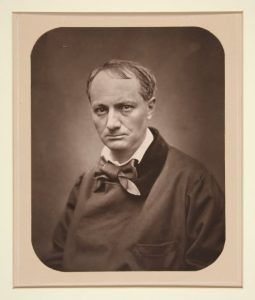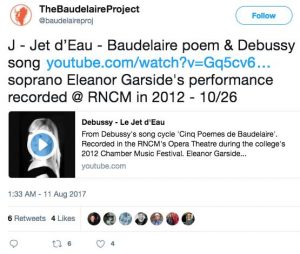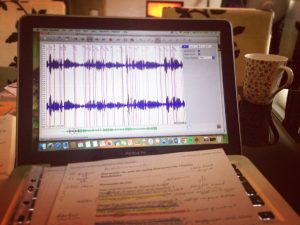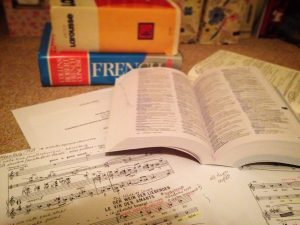This summer I had the opportunity to join the research team for the Baudelaire Song Project, exploring song settings of poetry of the French 19th century poet, Charles Baudelaire. In collaboration with Prof Helen Abbott and Dr Caroline Ardrey, I was able to join the team for 5 weeks exploring Baudelaire song settings – everything from classical arias to British rock bands and Italian heavy metal.

Yale University Art Gallery, Director’s Purchase and Arabella D. Huntington Memorial Funds.
The variety of musical genres that include Baudelaire’s poetry, whether in original French or translation into various languages is absolutely remarkable. In the first few weeks working on the project, it was exciting to explore this eclectic mixture of musical styles and translations of Baudelaire’s poems. Both Helen and Caroline from the very beginning were supportive, providing various starting points with articles and reading materials but above all encouraging me to explore personal interests and always follow research with an inquisitive outlook.
With quite a bit of surprise but equally growing curiosity at the remarkable variety of music featuring Baudelaire’s poetry, I produced an ‘A-Z of Baudelaire’ blog post for the Baudelaire Song Project website. This provided the opportunity to present in an accessible format short pieces of information about music and Baudelaire’s poetry. The blog encapsulated my findings so far and also sparked inspiration for social media activity. Posting for 24 days, one letter of the alphabet each day, I had the opportunity to run the Twitter and Facebook pages for the Baudelaire Song Project, with photo and video material to present my findings and showcase the variety of song settings using Baudelaire’s poetry.

It was really rewarding to see how the posts each day gained social media attention. The Twitter page was especially active with likes, retweets and gaining new followers who would tune in each day for the latest A-Z post! In a world where social media is ever increasing in popularity and influence, it was a valuable experience to run social media platforms for the research project, providing continuous and accessible media content about the current research.
In addition to navigating major social media platforms, I also felt pretty tech-savvy after learning how to use Sonic Visualiser as part of the Baudelaire Song Project research. This digital humanities technology offers innovative materials to support music research, especially for song settings. The chance to learn how to use the Sonic Visualiser program and see the use of this computer science technology in a humanities and arts research setting definitely sparked my interest. I’m curious to see where the combination of these disciplines may combine further in the future and offer more opportunities for researchers.

All along in the essence of the project was of course the music – so with listening to more and more Baudelaire settings, as a musician and a linguist, I was curious to consider ideas surrounding the use of an original text for a song versus a translation into another language. Do we experience listening to a song differently when it is not performed in the original language? Is the meaning of the text altered somewhat? Is anything lost in translation? Exploring these questions, I looked closely at various song settings in original French and in translation. To present these ideas, I produced a blog post about translation and performance for the Baudelaire Song Project website, offering thought provoking materials for musicians, linguists, researchers and everyday inquisitive readers alike!
A final part of my time on the project was contributing to a resource pack for the ‘Songs without Borders’ education project. This is an education project for secondary schools, that uses material from the Baudelaire Song Project. I created two worksheets for use in the schools, one – a music activity to encourage listening and two – with focus on French phrases and original Baudelaire poetry. The opportunity to be involved with producing materials for the education project allowed me to see how academic research can be taken beyond publishing books and articles and can be used in communities for education and cultural enrichment.

The Baudelaire Song Project offered me the chance to explore connections between my favourite subject areas – languages and music. Working alongside academics with exceptional expertise and connections worldwide, I was able to see there is a vibrant community for exploring these interests in combination and unlocking links between these subjects. The UoB Undergraduate Research Scholarship scheme is an opportunity to research areas you are passionate about with independent thought and creativity. The work you produce is unlike writing an essay for a university module or completing an assignment… you can offer a unique personal touch when presenting your findings and thoughts and it is all in fact quite liberating – you explore areas that really spark your interests and can lead you down research routes that are unusual and exciting.
Zoe Lumsden, BA Modern Languages and Music
